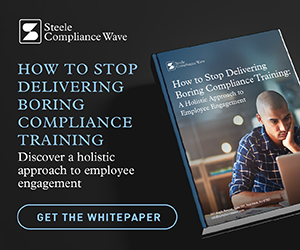9/11/17: Sanctions violations aren’t always straight lines. The U.S. Department of the Treasury’s Office of Foreign Assets Control (OFAC) made that clear recently when it designated 10 entities and six individuals for violating the UN Security Council Resolutions and attempting to evade US sanctions against North Korea. The action targets third-country companies and individuals that, among other things, enabled sanctioned North Korean entities to access the US and international financial systems. According to OFAC, “As a result of today’s action, any property or interests in property of the designated persons in the possession or control of U.S. persons or within the United States must be blocked, and U.S. persons are generally prohibited from dealing with them.” The action is a good reminder of the critical importance of knowing your third party associates.
Compliance Communications Blog
Compliance Wave
Recent Posts
9/11/17: For most companies, it is unthinkable to finance terrorism or human trafficking. But how certain are those companies that they are not providing those funds unknowingly through third parties in their supply chains? In a post on FCPA Compliance & Ethics, Brian Alster, Global Head of Compliance and Supply, Dun & Bradstreet, digs into the issue of third party transparency and compliance. He explores the need to arm corporate procurement teams with the tools needed to ensure visibility “… into every supplier relationship in order to manage those relationships.” The headline of Alster’s post explains why it is worth reading: “Procurement Pressure: The Convergence of Supply and Compliance.”
9/11/17: The EU’s General Data Protection Regulation (GDPR) is set to take effect in May 2018, but for companies with offices in the EU or manage data of EU citizens, it’s time to get ready. An article by Mark Goldin, contributor to InfoWorld, offers four basic actions designed to help companies begin the compliance process for the new data privacy regulation. With many companies just getting a handle on their responsibilities under GDPR, Goldin’s informed overview highlights key elements to consider.
8/2/17: Does requiring a drug-free workplace violate anti-discrimination laws? Maybe. In Massachusetts, an employee who was a registered medical marijuana user was fired for failing her employer’s drug test. According to the Massachusetts Supreme Judicial Court, that employee can proceed in state court with a disability discrimination claim. An article by Lisa Nagele-Piazza, SHRM-SCP, J.D. published by the Society for Human Resource Management (SHRM) explains the case and its possible challenges for anti-discrimination compliance.
8/2/17: Even though many elements of the EU Conflict Mineral Regulation on importers will not be fully implemented until 2021, all members of the supply chain – both upstream and downstream –will be affected. The July 9, 2017 regulation imposes different obligations on companies at different points along the product life cycle, but all companies should know which requirements will apply to them, when the requirements will become mandatory, and how to comply with them. An article posted by law firm Osborne Clark provides a review of the regulation, its key points, and what companies should be doing now.


